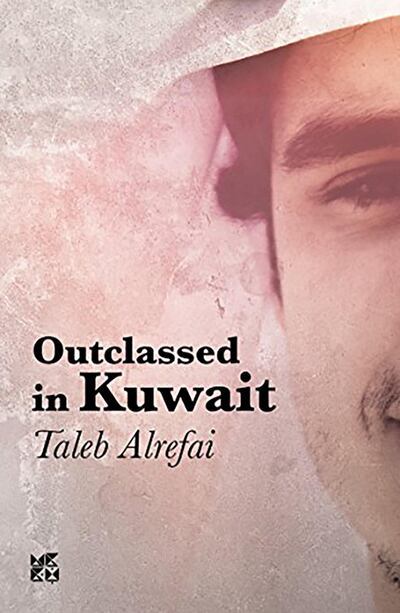In the recently published Outclassed in Kuwait, there are two, mirror images of author Taleb Alrefai. The first is the real, award-winning Kuwaiti writer, while the second is as narrator.
The biography opens with fictional Alrefai getting a call from a wealthy businessman named Khalid Khalifa requesting that he pen a novel-to-order.
This isn’t the sort of ghostwriting that’s common in English – where the rich pay an author to assemble their memoirs and then stamp their own name on the cover. Instead, this millionaire wants Alrefai to lend his name to the project. Khalifa wants an old-fashioned praise poem in his honour, written as a modern novel. It is this odd combination that spawns the book’s most interesting tensions.
“Praise novels” aren’t something a 21st century author usually undertakes, as narrator Alrefai quickly points out, and after receiving the offer he opts to talk things over with the late novelist Ismail Fahd Ismail. Ismail was a (real) friend of the (real) author, and this detail creates a new layer of mirroring and illusion.
Things get less real when Khalifa offers Alrefai 100,000 Kuwaiti dinars (Dh1.2 million) to write the book. Later, when Alrefai is offered more money to stop writing it, Ismail tells his friend to take the cash.
“No Arab writer ever makes that kind of money,” he claims.
Alrefai’s wife Shoroq also urges him to take payment. “What about our financial problems? My love, please forget about those wretched communist principles you believe in this one time.”
Shoroq’s commentary aside, this book isn’t about giving up on principles for commercial gain. Instead, it explores the bonds of family and the boundaries around what can and can’t be written in a country like Kuwait, a country currently debating literary censorship.
The book was suggested by Khalifa’s beloved eldest daughter, in light of the fact that her father’s health was failing. He clearly wants the book to vindicate his legacy – it’s meant to stand as a lasting monument to his achievements, much like Al Mutanabbi’s 10th century poems praising the ruler Sayf al-Dawla. Yet there’s another 21st century problem: Khalifa’s even wealthier wife is against the project.
Khalifa tells Alrefai that his wife Awatef mustn’t appear in the novel, and that his family life is off-limits. This is to be a novel only about Khalifa’s triumphs in business. The stipulation makes Alrefai wonder how is it possible to craft a sympathetic fictional character without exposing the personal?
In their first meeting, Khalifa confidently rattles off details of his childhood and schooling, but stumbles when Alrefai asks for more. As they get to know each other, their discussions become progressively more personal. Khalifa starts with his childhood resentments and moves on to his difficult relationship with his wife. The more he shares, the more he wants to share. Yet none of this can be published in the book.

Through a series of more intimate meetings, we come to care about this lonely Kuwaiti millionaire, who suffers from breathing difficulties and crippling anxiety. He knows people say he succeeded only because of his wife, and he's never felt accepted by Kuwait's wealthy families. The last thing the millionaire describes for Alrefai is an embarrassing evening when he tried to cheat on his wife yet found it impossible. This, too, is not for the book. Khalifa is caught between two warring desires: He wants and doesn't want the public to know who he really is.
“They see the false face: Khalid the millionaire, Khalid the son-in-law of Abdul Razzaq, Khalid the man who can get whatever he wants. Nobody knows anything about my real life.”
And yet his real life is off the record. Then Awatef steps in. After threatening her husband, she proceeds to threaten Alrefai, ordering him into her office as though he were a low-level employee. In the end, she shows him a report meant to demonstrate her husband’s unfit mind. Paradoxically, in the service of concealing family secrets, she reveals more of them.
Outclassed in Kuwait has echoes of Saud Alsanousi's compelling The Bamboo Stalk, where a Filipino-Kuwaiti protagonist fails to find a place for himself in the social hierarchy.
Khalifa, although rich and ethnically Kuwaiti, also finds himself with no place. His only friends, it seems, are his eldest daughter and his scribe.
Alrefai is himself an elusive presence. Although he’s our narrator, we learn little about him. He stands behind a curtain, existing only to translate Khalifa’s life to the page. Indeed, he shows there is a way to write a sympathetic main character while saying little about the character’s inner life.
In its English translation, the book has yet another Taleb Alrefai. It was translated by the (real) Taleb Alrefai, thus closing the book’s circle of mirrors.
_______________________
Read more:
WATCH: Thousands on hunt for a good read at world's biggest book sale
Anna Burns wins Booker Prize with Troubles tale Milkman
Booklava: the audiobook platform bringing the best of Arab literature to the masses
_______________________





